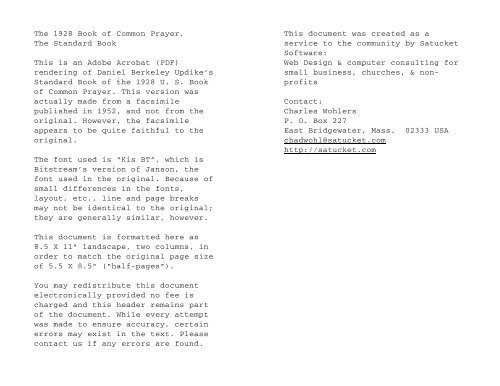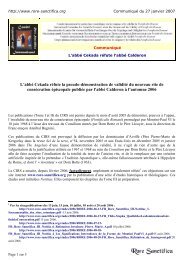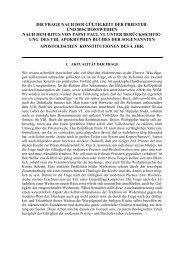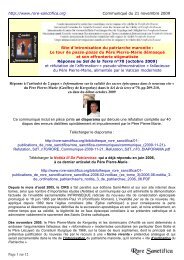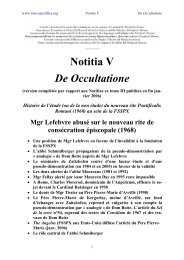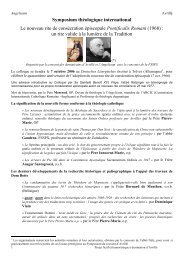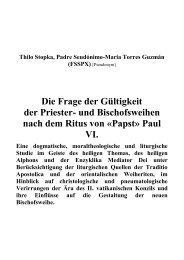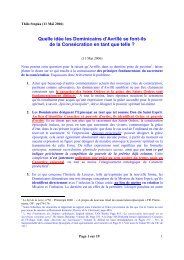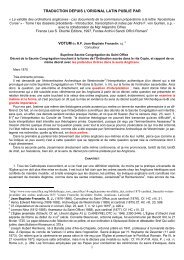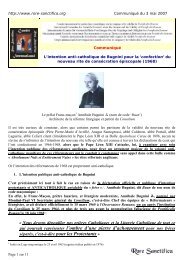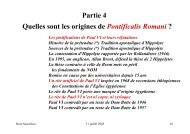The 1928 Book of Common Prayer, The Standard ... - Rore Sanctifica
The 1928 Book of Common Prayer, The Standard ... - Rore Sanctifica
The 1928 Book of Common Prayer, The Standard ... - Rore Sanctifica
Create successful ePaper yourself
Turn your PDF publications into a flip-book with our unique Google optimized e-Paper software.
<strong>The</strong> <strong>1928</strong> <strong>Book</strong> <strong>of</strong> <strong>Common</strong> <strong>Prayer</strong>,<br />
<strong>The</strong> <strong>Standard</strong> <strong>Book</strong><br />
This is an Adobe Acrobat (PDF)<br />
rendering <strong>of</strong> Daniel Berkeley Updike’s<br />
<strong>Standard</strong> <strong>Book</strong> <strong>of</strong> the <strong>1928</strong> U. S. <strong>Book</strong><br />
<strong>of</strong> <strong>Common</strong> <strong>Prayer</strong>. This version was<br />
actually made from a facsimile<br />
published in 1952, and not from the<br />
original. However, the facsimile<br />
appears to be quite faithful to the<br />
original.<br />
<strong>The</strong> font used is “Kis BT”, which is<br />
Bitstream’s version <strong>of</strong> Janson, the<br />
font used in the original. Because <strong>of</strong><br />
small differences in the fonts,<br />
layout, etc., line and page breaks<br />
may not be identical to the original;<br />
they are generally similar, however.<br />
This document was created as a<br />
service to the community by Satucket<br />
S<strong>of</strong>tware:<br />
Web Design & computer consulting for<br />
small business, churches, & nonpr<strong>of</strong>its<br />
Contact:<br />
Charles Wohlers<br />
P. O. Box 227<br />
East Bridgewater, Mass. 02333 USA<br />
chadwohl@satucket.com<br />
http://satucket.com<br />
This document is formatted here as<br />
8.5 X 11" landscape, two columns, in<br />
order to match the original page size<br />
<strong>of</strong> 5.5 X 8.5" (“half-pages”).<br />
You may redistribute this document<br />
electronically provided no fee is<br />
charged and this header remains part<br />
<strong>of</strong> the document. While every attempt<br />
was made to ensure accuracy, certain<br />
errors may exist in the text. Please<br />
contact us if any errors are found.
Articles <strong>of</strong> Religion<br />
As established by the Bishops, the Clergy, and the Laity <strong>of</strong> the<br />
Protestant Episcopal Church in the<br />
United States <strong>of</strong> America,<br />
in Convention, on the twelfth day <strong>of</strong> September,<br />
in the Year <strong>of</strong> our Lord,<br />
1801.
ARTICLES OF RELIGION.<br />
I. Of Faith in the Holy Trinity.<br />
THERE is but one living and true God, everlasting, without body, parts, or<br />
passions; <strong>of</strong> infinite power, wisdom, and goodness; the Maker, and<br />
Preserver <strong>of</strong> all things both visible and invisible. And in the unity <strong>of</strong> this<br />
Godhead there be three Persons, <strong>of</strong> one substance, power, and eternity; the<br />
Father, the Son, and the Holy Ghost.<br />
II. Of the Word or Son <strong>of</strong> God, which was made very Man.<br />
<strong>The</strong> Son, which is the Word <strong>of</strong> the Father, begotten from everlasting <strong>of</strong> the<br />
Father, the very and eternal God, and <strong>of</strong> one substance with the Father, took<br />
Man's nature in the womb <strong>of</strong> the blessed Virgin, <strong>of</strong> her substance: so that two<br />
whole and perfect Natures, that is to say, the Godhead and Manhood, were<br />
joined together in one Person, never to be divided, where<strong>of</strong> is one Christ, very<br />
God, and very Man; who truly suffered, was crucified, dead, and buried, to<br />
reconcile his Father to us, and to be a sacrifice, not only for original guilt, but also<br />
for actual sins <strong>of</strong> men.<br />
III. Of the going down <strong>of</strong> Christ into Hell.<br />
As Christ died for us, and was buried; so also it is to be believed, that he went<br />
down into Hell.<br />
IV. Of the Resurrection <strong>of</strong> Christ.<br />
Christ did truly rise again from death, and took again his body, with flesh,<br />
bones, and all things appertaining to the perfection <strong>of</strong> Man’s nature; wherewith<br />
he ascended into Heaven, and there sitteth, until he return to judge all Men at<br />
the last day.<br />
V. Of the Holy Ghost.<br />
<strong>The</strong> Holy Ghost, proceeding from the Father and the Son, is <strong>of</strong> one substance,<br />
majesty, and glory, with the Father and the Son, very and eternal God.<br />
VI. Of the Sufficiency <strong>of</strong> the Holy Scriptures for Salvation.<br />
Holy Scripture containeth all things necessary to salvation: so that whatsoever<br />
is not read therein, nor may be proved thereby, is not to be required <strong>of</strong> any man,<br />
that it should be believed as an article <strong>of</strong> the Faith, or be thought requisite or<br />
necessary to salvation. In the name <strong>of</strong> the Holy Scripture we do understand those<br />
canonical <strong>Book</strong>s <strong>of</strong> the Old and New Testament, <strong>of</strong> whose authority was never<br />
any doubt in the Church.<br />
Of the Names and Number <strong>of</strong> the Canonical <strong>Book</strong>s<br />
Genesis, <strong>The</strong> First <strong>Book</strong> <strong>of</strong> Samuel, <strong>The</strong> <strong>Book</strong> <strong>of</strong> Esther,<br />
Exodus, <strong>The</strong> Second <strong>Book</strong> <strong>of</strong> Samuel, <strong>The</strong> <strong>Book</strong> <strong>of</strong> Job,<br />
Leviticus, <strong>The</strong> First <strong>Book</strong> <strong>of</strong> Kings, <strong>The</strong> Psalms,<br />
Numbers, <strong>The</strong> Second <strong>Book</strong> <strong>of</strong> Kings, <strong>The</strong> Proverbs,<br />
Deuteronomy, <strong>The</strong> First <strong>Book</strong> <strong>of</strong> Chronicles, Ecclesiastes or Preacher,<br />
Joshua, <strong>The</strong> Second <strong>Book</strong> <strong>of</strong> Chronicles, Cantica, or Songs <strong>of</strong> Solomon,<br />
Judges, <strong>The</strong> First <strong>Book</strong> <strong>of</strong> Esdras, Four Prophets the greater,<br />
Ruth, <strong>The</strong> Second <strong>Book</strong> <strong>of</strong> Esdras, Twelve Prophets the less.
Articles <strong>of</strong> Religion<br />
And the other <strong>Book</strong>s (as Hierome saith) the Church doth read for example <strong>of</strong><br />
life and instruction <strong>of</strong> manners; but yet doth it not apply them to establish any<br />
doctrine; such are these following:<br />
<strong>The</strong> Third <strong>Book</strong> <strong>of</strong> Esdras,<br />
<strong>The</strong> Fourth <strong>Book</strong> <strong>of</strong> Esdras,<br />
<strong>The</strong> <strong>Book</strong> <strong>of</strong> Tobias,<br />
<strong>The</strong> <strong>Book</strong> <strong>of</strong> Judith,<br />
<strong>The</strong> rest <strong>of</strong> the <strong>Book</strong> <strong>of</strong> Esther,<br />
<strong>The</strong> <strong>Book</strong> <strong>of</strong> Wisdom,<br />
Jesus the Son <strong>of</strong> Sirach,<br />
Baruch the Prophet,<br />
<strong>The</strong> Song <strong>of</strong> the Three Children,<br />
<strong>The</strong> Story <strong>of</strong> Susanna,<br />
Of Bel and the Dragon,<br />
<strong>The</strong> <strong>Prayer</strong> <strong>of</strong> Manasses,<br />
<strong>The</strong> First <strong>Book</strong> <strong>of</strong> Maccabees,<br />
<strong>The</strong> Second <strong>Book</strong> <strong>of</strong> Maccabees.<br />
All the <strong>Book</strong>s <strong>of</strong> the New Testament, as they are commonly received, we do<br />
receive, and account them Canonical.<br />
VII. Of the Old Testament.<br />
<strong>The</strong> Old Testament is not contrary to the New: for both in the Old and New<br />
Testament everlasting life is <strong>of</strong>fered to Mankind by Christ, who is the only<br />
Mediator between God and Man, being both God and Man. Wherefore they are<br />
not to be heard, which feign that the old Fathers did look only for transitory<br />
promises. Although the Law given from God by Moses, as touching Ceremonies<br />
and Rites, do not bind Christian men, nor the Civil precepts there<strong>of</strong> ought <strong>of</strong><br />
necessity to be received in any commonwealth; yet notwith-standing, no<br />
Christian man whatsoever is free from the obedience <strong>of</strong> the Commandments<br />
which are called Moral.<br />
VIII. Of the Creeds.<br />
<strong>The</strong> Nicene Creed, and that which is commonly called the Apostles’ Creed,<br />
ought thoroughly to be received and believed: for they may be proved by most<br />
certain warrants <strong>of</strong> Holy Scripture.<br />
IX. Of Original or Birth Sin.<br />
Original sin standeth not in the following <strong>of</strong> Adam, (as the Pelagians do vainly<br />
talk;) but it is the fault and corruption <strong>of</strong> the Nature <strong>of</strong> every man, that naturally<br />
is engendered <strong>of</strong> the <strong>of</strong>fspring <strong>of</strong> Adam; whereby man is very far gone from<br />
original righteousness, and is <strong>of</strong> his own nature inclined to evil, so that the flesh<br />
lusteth always contrary to the Spirit; and therefore in every person born into this<br />
world, it deserveth God’s wrath and damnation. And this infection <strong>of</strong> nature<br />
doth remain, yea in them that are regenerated; whereby the lust <strong>of</strong> the flesh,<br />
called in Greek, , (which some do expound the wisdom, some<br />
sensuality, some the affection, some the desire, <strong>of</strong> the flesh), is not subject to the<br />
Law <strong>of</strong> God. And although there is no condemnation for them that believe and<br />
are baptized; yet the Apostle doth confess, that concupiscence and lust hath <strong>of</strong><br />
itself the nature <strong>of</strong> sin.<br />
X. Of Free Will.<br />
<strong>The</strong> condition <strong>of</strong> Man after the fall <strong>of</strong> Adam is such, that he cannot turn and<br />
prepare himself, by his own natural strength and good works, to faith, and calling<br />
upon God. Wherefore we have no power to do good works pleasant and<br />
Articles <strong>of</strong> Religion<br />
acceptable to God, without the grace <strong>of</strong> God by Christ preventing us, that we<br />
may have a good will, and working with us, when we have that good will.<br />
XI. Of the Justification <strong>of</strong> Man.<br />
We are accounted righteous before God, only for the merit <strong>of</strong> our Lord and<br />
Saviour Jesus Christ by Faith, and not for our own works or deservings.<br />
Wherefore, that we are justified by Faith only, is a most wholesome Doctrine,<br />
and very full <strong>of</strong> comfort, as more largely is expressed in the Homily <strong>of</strong><br />
Justification.<br />
XII. Of Good Works.<br />
Albeit that Good Works, which are the fruits <strong>of</strong> Faith, and follow after<br />
Justification, cannot put away our sins, and endure the severity <strong>of</strong> God's<br />
judgment; yet are they pleasing and acceptable to God in Christ, and do spring<br />
out necessarily <strong>of</strong> a true and lively Faith; insomuch that by them a lively Faith<br />
may be as evidently known as a tree discerned by the fruit.<br />
XIII. Of Works before Justification.<br />
Works done before the grace <strong>of</strong> Christ, and the Inspiration <strong>of</strong> the Spirit, are not<br />
pleasant to God, forasmuch as they spring not <strong>of</strong> faith in Jesus Christ; neither do<br />
they make men meet to receive grace, or (as the School-authors say) deserve<br />
grace <strong>of</strong> congruity: yea rather, for that they are not done as God hath willed and<br />
commanded them to be done, we doubt not but they have the nature <strong>of</strong> sin.<br />
XIV. Of Works <strong>of</strong> Supererogation.<br />
Voluntary Works besides, over and above, God's Commandments, which they<br />
call Works <strong>of</strong> Supererogation, cannot be taught without arrogancy and impiety:<br />
for by them men do declare, that they do not only render unto God as much as<br />
they are bound to, but that they do more for his sake, than <strong>of</strong> bounden duty is<br />
required: whereas Christ saith plainly, When ye have done all that are<br />
commanded to you, say, We are unpr<strong>of</strong>itable servants.<br />
XV. Of Christ alone without Sin.<br />
Christ in the truth <strong>of</strong> our nature was made like unto us in all things, sin only<br />
except, from which he was clearly void, both in his flesh, and in his spirit. He<br />
came to be the Lamb without spot, who, by sacrifice <strong>of</strong> himself once made,<br />
should take away the sins <strong>of</strong> the world; and sin (as Saint John saith) was not in<br />
him. But all we the rest, although baptized, and born again in Christ, yet <strong>of</strong>fend<br />
in many things; and if we say we have no sin, we deceive ourselves, and the truth<br />
is not in us.<br />
XVI. Of Sin after Baptism.<br />
Not every deadly sin willingly committed after Baptism is sin against the Holy<br />
Ghost, and unpardonable. Wherefore the grant <strong>of</strong> repentance is not to be denied<br />
to such as fall into sin after Baptism. After we have received the Holy Ghost, we<br />
may depart from grace given, and fall into sin, and by the grace <strong>of</strong> God we may
Articles <strong>of</strong> Religion<br />
arise again, and amend our lives. And therefore they are to be condemned, which<br />
say, they can no more sin as long as they live here, or deny the place <strong>of</strong><br />
forgiveness to such as truly repent.<br />
XVII. Of Predestination and Election<br />
Predestination to Life is the everlasting purpose <strong>of</strong> God, whereby (before the<br />
foundations <strong>of</strong> the world were laid) he hath constantly decreed by his counsel<br />
secret to us, to deliver from curse and damnation those whom he hath chosen in<br />
Christ out <strong>of</strong> mankind, and to bring them by Christ to ever-lasting salvation, as<br />
vessels made to honour. Wherefore, they which be endued with so excellent a<br />
benefit <strong>of</strong> God, be called according to God’s purpose by his Spirit working in<br />
due season: they through Grace obey the calling: they be justified freely: they<br />
be made sons <strong>of</strong> God by adoption: they be made like the image <strong>of</strong> his onlybegotten<br />
Son Jesus Christ: they walk religiously in good works, and at length, by<br />
God’s mercy, they attain to everlasting felicity.<br />
As the godly consideration <strong>of</strong> Predestination, and our Election in Christ, is<br />
full <strong>of</strong> sweet, pleasant, and unspeakable comfort to godly persons, and such as<br />
feel in themselves the working <strong>of</strong> the Spirit <strong>of</strong> Christ, mortifying the works <strong>of</strong> the<br />
flesh, and their earthly members, and drawing up their mind to high and<br />
heavenly things, as well because it doth greatly establish and confirm their faith<br />
<strong>of</strong> eternal Salvation to be enjoyed through Christ, as because it doth fervently<br />
kindle their love towards God: So, for curious and carnal persons, lacking the<br />
Spirit <strong>of</strong> Christ, to have continually before their eyes the sentence <strong>of</strong> God’s<br />
Predestination, is a most dangerous downfall, whereby the Devil doth thrust<br />
them either into desperation, or into wrethchlessness <strong>of</strong> most unclean living, no<br />
less perilous than desperation.<br />
Furthermore, we must receive God’s promises in such wise, as they be<br />
generally set forth to us in Holy Scripture: and, in our doings, that Will <strong>of</strong> God<br />
is to be followed, which we have expressly declared unto us in the word <strong>of</strong> God.<br />
XVIII. Of obtaining eternal Salvation only by the Name <strong>of</strong> Christ.<br />
<strong>The</strong>y also are to be had accursed that presume to say, That every man shall be<br />
saved by the Law or Sect which he pr<strong>of</strong>esseth, so that he be diligent to frame his<br />
life according to that Law, and the light <strong>of</strong> Nature. For Holy Scripture doth set<br />
out unto us only the Name <strong>of</strong> Jesus Christ, whereby men must be saved.<br />
XIX. Of the Church.<br />
<strong>The</strong> visible Church <strong>of</strong> Christ is a congregation <strong>of</strong> faithful men, in which the pure<br />
Word <strong>of</strong> God is preached, and the Sacraments be duly ministered according to<br />
Christ’s ordinance, in all those things that <strong>of</strong> necessity are requisite to the same.<br />
As the Church <strong>of</strong> Jerusalem, Alexandria, and Antioch, have erred; so also the<br />
Church <strong>of</strong> Rome hath erred, not only in their living and manner <strong>of</strong> Ceremonies,<br />
but also in matters <strong>of</strong> Faith.<br />
Articles <strong>of</strong> Religion<br />
XX. Of the Authority <strong>of</strong> the Church.<br />
<strong>The</strong> Church hath power to decree Rites or Ceremonies, and authority in Controversies<br />
<strong>of</strong> Faith: and yet it is not lawful for the Church to ordain anything that<br />
is contrary to God’s Word written, neither may it so expound one place <strong>of</strong><br />
Scripture, that it be repugnant to another. Wherefore, although the Church be<br />
a witness and a keeper <strong>of</strong> Holy Writ, yet, as it ought not to decree any thing<br />
against the same, so besides the same ought not to enforce any thing to be<br />
believed for necessity <strong>of</strong> Salvation.<br />
XXI. Of the Authority <strong>of</strong> General Councils.<br />
[<strong>The</strong> Twenty-first <strong>of</strong> the former Articles is omitted; because it is partly <strong>of</strong> a local<br />
and civil nature, and is provided for, as to the remaining parts <strong>of</strong> it, in other<br />
Articles.]<br />
XXII. Of Purgatory.<br />
<strong>The</strong> Romish Doctrine concerning Purgatory, Pardons, Worshipping and Adoration,<br />
as well <strong>of</strong> Images as <strong>of</strong> Relics, and also Invocation <strong>of</strong> Saints, is a fond<br />
thing, vainly invented, and grounded upon no warranty <strong>of</strong> Scripture, but rather<br />
repugnant to the Word <strong>of</strong> God.<br />
XXIII. Of Ministering in the Congregation<br />
It is not lawful for any man to take upon him the <strong>of</strong>fice <strong>of</strong> public preaching, or<br />
ministering the Sacraments in the Congregation, before he be lawfully called,<br />
and sent to execute the same. And those we ought to judge lawfully called and<br />
sent, which be chosen and called to this work by men who have public authority<br />
given unto them in the Congregation, to call and send Ministers into the Lord’s<br />
vineyard.<br />
XXIV. Of Speaking in the Congregation in such a Tongue as the people<br />
understandeth.<br />
It is a thing plainly repugnant to the Word <strong>of</strong> God, and the custom <strong>of</strong> the<br />
Primitive Church, to have public <strong>Prayer</strong> in the Church, or to minister the<br />
Sacraments, in a tongue not understanded <strong>of</strong> the people.<br />
XXV. Of the Sacraments.<br />
Sacraments ordained <strong>of</strong> Christ be not only badges or tokens <strong>of</strong> Christian men’s<br />
pr<strong>of</strong>ession, but rather they be certain sure witnesses, and effectual signs <strong>of</strong> grace,<br />
and God’s good will towards us, by the which he doth work invisibly in us, and<br />
doth not only quicken, but also strengthen and confirm our Faith in him.<br />
<strong>The</strong>re are two Sacraments ordained <strong>of</strong> Christ our Lord in the Gospel, that<br />
is to say, Baptism, and the Supper <strong>of</strong> the Lord.<br />
Those five commonly called Sacraments, that is to say, Confirmation, Penance,<br />
Orders, Matrimony, and Extreme Unction, are not to be counted for Sacraments<br />
<strong>of</strong> the Gospel, being such as have grown partly <strong>of</strong> the corrupt following<br />
<strong>of</strong> the Apostles, partly are states <strong>of</strong> life allowed in the Scriptures; but yet have not<br />
like nature <strong>of</strong> Sacraments with Baptism, and the Lord’s Supper, for that they<br />
have not any visible sign or ceremony ordained <strong>of</strong> God.
Articles <strong>of</strong> Religion<br />
<strong>The</strong> Sacraments are not ordained <strong>of</strong> Christ to be gazed upon, or to be carried<br />
about, but that we should duly use them. And in such only as worthily receive<br />
the same, they have a wholesome effect or operation: but they that receive them<br />
unworthily, purchase to themselves damnation, as Saint Paul saith.<br />
XXVI. Of the Unworthiness <strong>of</strong> the Ministers, which hinders not the effect <strong>of</strong><br />
the Sacraments.<br />
Although in the visible Church the evil be ever mingled with the good, and<br />
sometimes the evil have chief authority in the Ministration <strong>of</strong> the Word and<br />
Sacraments, yet forasmuch as they do not the same in their own name, but in<br />
Christ's, and do minister by his commission and authority, we may use their<br />
Ministry, both in hearing the Word <strong>of</strong> God, and in receiving the Sacraments.<br />
Neither is the effect <strong>of</strong> Christ's ordinance taken away by their wickedness, nor<br />
the grace <strong>of</strong> God’s gifts diminished from such as by faith, and rightly, do receive<br />
the Sacraments ministered unto them; which be effectual, because <strong>of</strong> Christ’s<br />
institution and promise, although they be ministered by evil men.<br />
Nevertheless, it appertaineth to the discipline <strong>of</strong> the Church, that inquiry be<br />
made <strong>of</strong> evil Ministers, and that they be accused by those that have knowledge<br />
<strong>of</strong> their <strong>of</strong>fences; and finally, being found guilty, by just judgment be deposed.<br />
XVII. Of Baptism<br />
Baptism is not only a sign <strong>of</strong> pr<strong>of</strong>ession, and mark <strong>of</strong> difference, whereby<br />
Christian men are discerned from others that be not christened, but it is also a<br />
sign <strong>of</strong> Regeneration or New-Birth, whereby, as by an instrument, they that<br />
receive Baptism rightly are grafted into the Church; the promises <strong>of</strong> the<br />
forgiveness <strong>of</strong> sin, and <strong>of</strong> our adoption to be the sons <strong>of</strong> God by the Holy Ghost,<br />
are visibly signed and sealed; Faith is confirmed, and Grace increased by virtue<br />
<strong>of</strong> prayer unto God.<br />
<strong>The</strong> Baptism <strong>of</strong> young Children is in any wise to be retained in the Church,<br />
as most agreeable with the institution <strong>of</strong> Christ.<br />
XVIII. Of the Lord’s Supper.<br />
<strong>The</strong> Supper <strong>of</strong> the Lord is not only a sign <strong>of</strong> the love that Christians ought to<br />
have among themselves one to another; but rather it is a Sacrament <strong>of</strong> our<br />
Redemption by Christ’s death: insomuch that to such as rightly, worthily, and<br />
with faith, receive the same, the Bread which we break is a partaking <strong>of</strong> the Body<br />
<strong>of</strong> Christ; and likewise the Cup <strong>of</strong> Blessing is a partaking <strong>of</strong> the Blood <strong>of</strong> Christ.<br />
Transubstantiation (or the change <strong>of</strong> the substance <strong>of</strong> Bread and Wine) in the<br />
Supper <strong>of</strong> the Lord, cannot be proved by Holy Writ; but is repugnant to the<br />
plain words <strong>of</strong> Scripture, overthroweth the nature <strong>of</strong> a Sacrament, and hath<br />
given occasion to many superstitions.<br />
<strong>The</strong> Body <strong>of</strong> Christ is given, taken, and eaten, in the Supper, only after an<br />
heavenly and spiritual manner. And the mean whereby the Body <strong>of</strong> Christ is<br />
received and eaten in the Supper, is Faith.<br />
<strong>The</strong> Sacrament <strong>of</strong> the Lord’s Supper was not by Christ’s ordinance reserved,<br />
carried about, lifted up, or worshipped.<br />
Articles <strong>of</strong> Religion<br />
XXIX. Of the Wicked, which eat not the Body <strong>of</strong> Christ in the use <strong>of</strong> the Lord's<br />
Supper.<br />
<strong>The</strong> Wicked, and such as be void <strong>of</strong> a lively faith, although they do carnally and<br />
visibly press with their teeth (as Saint Augustine saith) the Sacrament <strong>of</strong> the<br />
Body and Blood <strong>of</strong> Christ; yet in no wise are they partakers <strong>of</strong> Christ: but rather,<br />
to their condemnation, do eat and drink the sign or Sacrament <strong>of</strong> so great a thing.<br />
XXX. Of both Kinds.<br />
<strong>The</strong> Cup <strong>of</strong> the Lord is not to be denied to the Lay-people: for both the parts <strong>of</strong><br />
the Lord’s Sacrament, by Christ’s ordinance and commandment, ought to be<br />
ministered to all Christian men alike.<br />
XXXI. Of the one Oblation <strong>of</strong> Christ finished upon the Cross.<br />
<strong>The</strong> Offering <strong>of</strong> Christ once made in that perfect redemption, propitiation, and<br />
satisfaction, for all the sins <strong>of</strong> the whole world, both original and actual; and<br />
there is none other satisfaction for sin, but that alone. Wherefore the sacrifices<br />
<strong>of</strong> Masses, in the which it was commonly said, that the Priest did <strong>of</strong>fer Christ for<br />
the quick and the dead, to have remission <strong>of</strong> pain or guilt, were blasphemous<br />
fables, and dangerous deceits.<br />
XXXII. Of the Marriage <strong>of</strong> Priests.<br />
Bishops, Priests, and Deacons, are not commanded by God’s Law, either to vow<br />
the estate <strong>of</strong> single life, or to abstain from marriage: therefore it is lawful for<br />
them, as for all other Christian men, to marry at their own discretion, as they<br />
shall judge the same to serve better to godliness.<br />
XXXIII. Of excommunicate Persons, how they are to be avoided.<br />
That person which by open denunciation <strong>of</strong> the Church is rightly cut <strong>of</strong>f from<br />
the unity <strong>of</strong> the Church, and excommunicated, ought to be taken <strong>of</strong> the whole<br />
multitude <strong>of</strong> the faithful, as an Heathen and Publican, until he be openly<br />
reconciled by penance, and received into the Church by a Judge that hath the<br />
authority thereunto.<br />
XXXIV. Of the Traditions <strong>of</strong> the Church.<br />
It is not necessary that the Traditions and Ceremonies be in all places one, or<br />
utterly like; for at all times they have been divers, and may be changed according<br />
to the diversity <strong>of</strong> countries, times, and men’s manners, so that nothing be<br />
ordained against God’s Word. Whosoever, through his private judgment,<br />
willingly and purposely, doth openly break the Traditions and Ceremonies <strong>of</strong> the<br />
Church, which be not repugnant to the Word <strong>of</strong> God, and be ordained and<br />
approved by common authority, ought to be rebuked openly, (that others may<br />
fear to do the like,) as he that <strong>of</strong>fendeth against the common order <strong>of</strong> the Church,<br />
and hurteth the authority <strong>of</strong> the Magistrate, and woundeth the consciences <strong>of</strong> the<br />
weak brethren.<br />
Every particular or national Church hath authority to ordain, change, and
Articles <strong>of</strong> Religion<br />
abolish, Ceremonies or Rites <strong>of</strong> the Church ordained only by man’s authority,<br />
so that all things be done to edifying.<br />
XXXV. Of the Homilies.<br />
<strong>The</strong> Second <strong>Book</strong> <strong>of</strong> Homilies, the several titles where<strong>of</strong> we have joined under<br />
this Article, doth contain a godly and wholesome Doctrine, and necessary for<br />
these times, as doth the former <strong>Book</strong> <strong>of</strong> Homilies, which were set forth in the<br />
time <strong>of</strong> Edward the Sixth; and therefore we judge them to be read in Churches<br />
by the Ministers, diligently and distinctly, that they may be understanded <strong>of</strong> the<br />
people.<br />
Articles <strong>of</strong> Religion<br />
and possession <strong>of</strong> the same; as certain Anabaptists do falsely boast.<br />
Notwithstanding, every man ought, <strong>of</strong> such things as he possesseth, liberally to<br />
give alms to the poor, according to his ability.<br />
XXXIX. Of a Christian Man’s Oath.<br />
As we confess that vain and rash Swearing is forbidden Christian men by our<br />
Lord Jesus Christ, and James his Apostle, so we judge, that Christian Religion<br />
doth not prohibit, but that a man may swear when the Magistrate requireth, in<br />
a cause <strong>of</strong> faith and charity, so it be done according to the Prophet’s teaching in<br />
justice, judgment, and truth.<br />
Of the Names <strong>of</strong> the Homilies<br />
1 Of the right Use <strong>of</strong> the Church. 12 Of the Nativity <strong>of</strong> Christ.<br />
2 Against Peril <strong>of</strong> Idolatry. 13 Of the Passion <strong>of</strong> Christ.<br />
3 Of repairing and keeping clean <strong>of</strong> Churches. 14 Of the Resurrection <strong>of</strong> Christ.<br />
4 Of good Works: first <strong>of</strong> Fasting. 15 Of the worthy receiving <strong>of</strong> the Sacrament<br />
5 Against Gluttony and Drunkenness. <strong>of</strong> the Body and Blood <strong>of</strong> Christ.<br />
6 Against Excess <strong>of</strong> Apparel. 16 Of the Gifts <strong>of</strong> the Holy Ghost.<br />
7 Of <strong>Prayer</strong>. 17 For the Rogation-days.<br />
8 Of the Place and Time <strong>of</strong> <strong>Prayer</strong>. 18 Of the State <strong>of</strong> Matrimony.<br />
9 That <strong>Common</strong> <strong>Prayer</strong>s and Sacraments 19 Of Repentance.<br />
ought to be ministered in a known tongue. 20 Against Idleness.<br />
10 Of the reverend Estimation <strong>of</strong> God’s Word. 21 Against Rebellion.<br />
11 Of Alms-doing.<br />
[This Article is received in this Church, so far as it declares the <strong>Book</strong> <strong>of</strong> Homilies to be an<br />
explication <strong>of</strong> Christian doctrine, and instructive in piety and morals. But all references to the<br />
constitution and laws <strong>of</strong> England are considered as inapplicable to the circum-stances <strong>of</strong> this<br />
Church; which also suspends the order for the reading <strong>of</strong> said Homilies in churches, until a<br />
revision <strong>of</strong> them may be conveniently made, for the clearing <strong>of</strong> them, as well from obsolete words<br />
and phrases, as from the local references.]<br />
XXXVI. Of Consecration <strong>of</strong> Bishops and Ministers.<br />
<strong>The</strong> <strong>Book</strong> <strong>of</strong> Consecration <strong>of</strong> Bishops, and Ordering <strong>of</strong> Priests and Deacons, as<br />
set forth by the General Convention <strong>of</strong> this Church in 1792, doth contain all<br />
things necessary to such Consecration and Ordering; neither hath it any thing<br />
that, <strong>of</strong> itself, is superstitious and ungodly. And, therefore, whosoever are<br />
consecrated or ordered according to said Form, we decree all such to be rightly,<br />
orderly, and lawfully consecrated and ordered.<br />
XXXVII. Of the Power <strong>of</strong> the Civil Magistrates.<br />
<strong>The</strong> Power <strong>of</strong> the Civil Magistrate extendeth to all men, as well Clergy as Laity,<br />
in all things temporal; but hath no authority in things purely spiritual. And we<br />
hold it to be the duty <strong>of</strong> all men who are pr<strong>of</strong>essors <strong>of</strong> the Gospel, to pay<br />
respectful obedience to the Civil Authority, regularly and legitimately<br />
constituted.<br />
XXXVIII. Of Christian Men’s Goods, which are not common.<br />
<strong>The</strong> Riches and Goods <strong>of</strong> Christians are not common, as touching the right, title,


